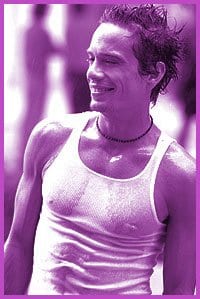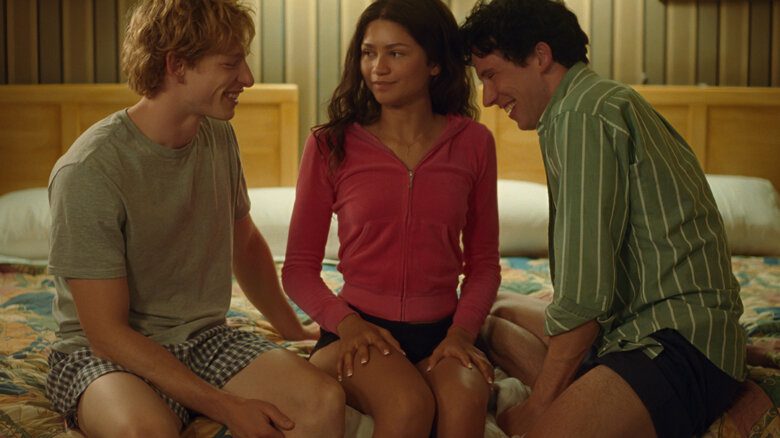If you’re wondering why Making Scenes, Ottawa’s annual queer film and video festival, is running a month late, blame it on August’s province-wide blackout, which knocked out power for over five days.
“This year has been a nightmare for us,” says Dan Grummisch, executive director of Making Scenes. “An absolute nightmare.”
While local politicians began planning how to use Ottawa’s blackout as political fodder, the crew of Making Scenes lost valuable festival preparation time, day by day. The headquarters, at 2 Daly Ave, a city facility, was shut down.
As daily headlines told civil servants to stay home and city residents to conserve power, Making Scenes discovered their printer was off-line and backed up with jobs. The printer couldn’t guarantee the festival program would be ready in time. After some deliberation, Grummisch and Making Scenes general designer Glenn Crawford sat down with co-organizers and sponsors to make a decision.
“We looked at it,” says Grummisch, “and decided this is cutting it pretty tight.'”
But even after the decision to move the festival from its original slated run on Sept 18 to 21 to Oct 16 to 19, Grummisch was faced with another complication. A venue change from the National Archives to the World Exchange Plaza forced yet another change in dates. The festival will now take place Oct 20 through Oct 23. At press time, the website was on-line but not updated, containing promises that information about 2003 ticket information screenings and events was coming soon.
“It just seemed like we had failed somehow,” Grummisch says. His festival colleagues throughout North America, though, reassured him that glitches happen – from film screenings being cancelled at the last minute because the movie is unavailable to freak power shortages.
“They said, ‘Are you kidding? It happens all the time!’ And I realized it does. We were a little freaked out. We’ve been really, really lucky in Ottawa.” Grummisch no longer sees the printer problem as a very big deal.
The blackness even held some light toward the end. He and Crawford are now considering holding Making Scenes in October instead of September from now on because there are fewer events to compete with in the queer community at this time of the year. September events included the AIDS Walk Ottawa and Kinkfest, the new Bondage, Discipline and Sado-masochism workshops run by Venus Envy.
The later date will also save money. Previously, the festival shipped films over from Europe for high fees and passed the flicks along to other North American queer film festivals. Now, festivals such as image+nation, in Montreal, and ImageOut, in Rochester, New York, will get the reels first and pass them along.
Although a Making Scenes program was not available at press time, some of this year’s films sound like they’re off the beaten track. Two are BBC productions. Tipping The Velvet, based on the book by Sarah Waters, follows the debauched journey of Nan Astley through the Victorian England underground. From encounters with male impersonators to cabaret singers, this one sounds like what girls’ night out at the Lookout should be. The Canadian premiere of Sex, Politics & Cocktails might be more aptly entitled Sex, Lies and LA. Starving filmmaker Sebastian moves to Los Angeles and makes documentaries about gay relationships. Guided by his friend Daria, a soap opera actress, he makes a foray into the LA scene. Sebastian also considers doing more than simply filming gay relationships.
The Broken Thread (Le Fil cassé), a National Film Board production, is gay filmmaker Michel Langlois’ attempt to leave his mark. Using archival photos, reenactments and documentary footage, Langlois attempts to trace a family line fraught with secrets and coincidences, such as isolation and homosexuality.
Crawford is harried but happy as he tries to hold all the threads together over long hours at headquarters.
“It’s just two people in an office and we’re trying to run a festival,” Crawford says. “We’re doing the best we can.”
While this is Crawford’s first year with Making Scenes, Grummisch started off as president of the board of directors in 2000. He has been executive director since 2001. He attributes his current situation to the festival’s cultural importance – and a friend.
“I blame Tracey Clark,” Grummisch says, with a laugh. “She and I went to high school together. We met up at some opening, started talking and she said, ‘I’m the president of the board of Making Scenes. Do you want to join?’ And I thought stupidly, ‘Yeah, okay,’ not knowing that I’d actually been assimilated.”
At this point, Grummisch tells the Capital Xtra reporter to hold on – he’ll call right back. He’s hurtling down the expressway from Hull to Ottawa in his newly tuned-up Volvo station wagon. He is en route to pick up José Sánchez, the director of programming for Making Scenes, who is also a professor at Carleton University. A cigarette in one hand, cell phone in the other, Grummisch attempts to drive a standard. “Whoah – I’m going to die!” he exclaims and decides to lose the smoke. Grummisch returns to talking about the changing role of Making Scenes.
“We’re hoping to work as an umbrella organization that helps the gay choir deal with graphic design, deals with Act Out Theatre,” Grummisch says over the background din of traffic. “Maybe Making Scenes can morph itself into something that isn’t just film and video.” He adds that the Ottawa GLBTQ (Gay, Lesbian, Bisexual, Transgender and Queer) Community Centre website was mistakenly reported as being done by Pink Triangle Services (PTS), but was done in conjunction between Glenn Crawford and PTS.
The prevalence of more mainstream images of queer culture has made Grummisch get on this change kick. Television shows and movies such as Queer As Folk and Mambo Italiano were not around when the festival began in 1992. Making Scenes must now offer audiences something they can’t find on specialty channels or in multiplex theatres. Nonetheless, film and video are still the mainstays. Many people tell him that the festival helps them connect.
“One woman,” recalls Grummisch, “a single mother, divorced, never really came out, said that Making Scenes was the only contact she had with the queer community and the only place that she actually felt she was part of something. She was almost in tears.”
The last setback for Making Scenes was Sep 11, which caused low attendance. They also had trouble getting certain films because of grounded air traffic. As Grummisch turns on to Sunnyside Ave from Bronson, he is optimistic about overcoming past trials and the festival’s future.
“It’s going to be a really good year,” Grummisch says. “It’s going to test where Making Scenes is going. We have so many people who support us and help us in amazing ways that it just makes me want to cry sometimes.
“I think now it’s time for us to start standing up and saying, ‘Hey! We’re doing this!”
MAKING SCENES QUEER FILM & VIDEO FESTIVAL.
Oct 2023.
Cineplex Odeon, World Exchange Plaza.
www.makingscenes.ca.

 Why you can trust Xtra
Why you can trust Xtra


